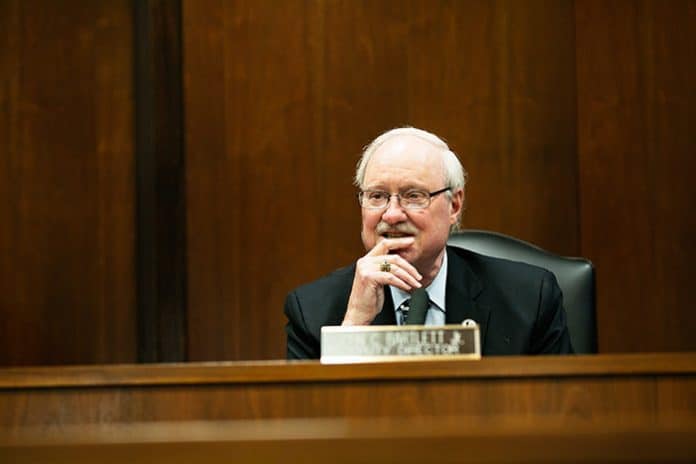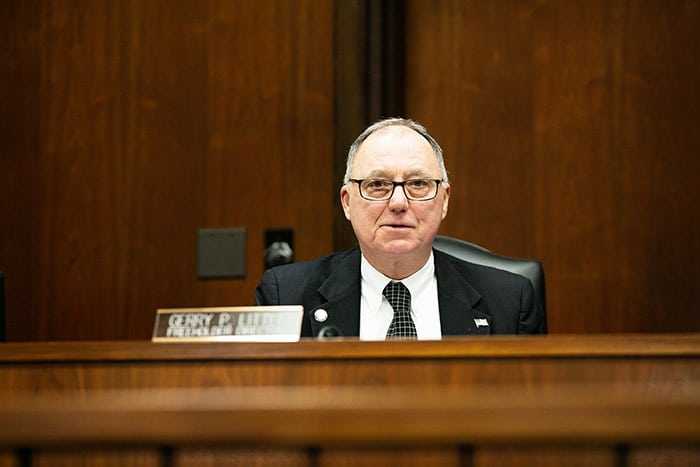
OCEAN COUNTY – Does an antiquated name keep people from participating in the political process? Some Trenton politicians believe so and want a change that they say aligns with 21st Century sensibilities.
Republican Senator and Whip Joe Pennacchio (R-26) sponsored bill S402 that will change “freeholder” to “county commissioner,” and “board of chosen freeholders” to “board of county commissioners.”
While the original language allowed counties to decide whether to change their names, a senate substitute – if passed – would require the name change. It’s a change that not only distracts from what really ails the state, but buckles to PC warriors who want to deny and dismantle history, Ocean County officials said.
“This is the Ocean County Board of Chosen Freeholders. It has been since 1850,” Freeholder John C. Bartlett Jr. said. “…It pains me to think the state senate has before it a bill which would change the name of all board of chosen freeholders in New Jersey to ‘board of commissioners.’ I don’t know of a nice way to say this, and I’m not going to try: I can’t think of a more stupid idea.”
What is a freeholder?
In modern parlance, a freeholder is an elected member to the board of chosen freeholders, the body that runs each of New Jersey’s 21 counties. The body can have between three and nine freeholders. The term is unique to New Jersey county government, and comes from the state’s 1776 constitution: “That all inhabitants of this Colony, of full age, who are worth fifty pounds proclamation money, clear estate in the same, and have resided within the county in which they claim a vote for twelve months immediately preceding the election, shall be entitled to vote for Representatives in Council and Assembly; and also for all other public officers, that shall be elected by the people of the county at large.”
The term describes a property-owning male free of debt, and not many people in New Jersey know what a freeholder is, Pennacchio said in a March 26 press release. “Commissioner” is more recognizable and inoffensive term.
Currently, Virginia Haines is the only female freeholder serving on the county’s five-member board. In Monmouth County, Deputy Director Lillian G. Burry is the only female on its five-member board. Burlington County also has five members, two of whom are women and one, Kate Gibbs, is director. In Atlantic County, its nine-member board has four women.

“New Jersey stands alone while other states have changed the position of freeholder to a commissioner, modernizes the position,” said Pennacchio. “When you have a title, which refers to men ‘free and clear,’ you ultimately discourage individuals from participating in critical local government positions.”
But Ocean County itself already had 12 commissions, “all of which have commissioners,” Bartlett said. There are more than 100 commissioners in the county. Some municipalities in Ocean County – Long Beach Township and Beach Haven, for example – have a commissioner form of government. And Freeholder Ginny Haines was commissioner of the New Jersey State Lottery. The governor’s cabinet are commissioners.
“The term is one of the most overused terms in American governance today,” Bartlett added. “…The state is rife with commissions and commissioners.
“At least if you’re going to come up with a new name, come up with something that makes some sense,” Bartlett said.
New Jersey, being one of the 13 original colonies, should be proud of its colonial heritage, Bartlett said. The state legislature is saying there are parts of the state’s history it doesn’t like and wants to wipe out that history. You don’t throw away the past.
“It seems to me we are in a frenzy in this country right now to tear down statues, to tear down monuments, to tear down things that perhaps have pieces of them that might not be appropriate today, but were appropriate in their own term and time,” Bartlett said. He has served as freeholder for 38 years, the longest to date in the state. “But to suggest that the office of freeholder, that the term freeholder…is in some way sexist, or is in some way racist, is downright insulting.”
2017 saw a rash of statues and memorials removed of Confederate leaders, including Confederate General Robert E. Lee in several states.
Should the bill become law, all county letterheads, stationary, “all other writings,” and websites would have to show the name change on Jan. 1, 2019. Signs that would require “the expenditure of county funds” to change can be updated “upon the next update or replacement made in the ordinary course of business.”
“New Jersey has a lot of problems. We have a pension system that they say is bankrupt. Our state has had 11 or 12 bond rating declines. Education funding is a mess…Our higher education, they’re underfunding that, they don’t fund vocational schools. Our roads and bridges around the state are falling apart, except here in our county system and other county systems,” Freeholder Director Gerry P. Little said. “The state is wasting time on doing something which is totally superfluous, will not address the real issues. It refocuses attention from the real issues on something that’s irrelevant.”
Haines agreed with her fellow freeholders’ assessments in an April 23 email to Jersey Shore Online.
“I am against changing the title of freeholder to commissioner. I feel Senator Pennacchio is changing history, the state has many other issues of more importance to handle, than changing the name of county officials,” Haines said. “…When I travel to other states and tell them I am a freeholder I explain it is the term which was given to individuals who run the government on a county level. I have never had anyone say anything negative about the term freeholder. Once I explain the term they just simply say ‘Oh, ok.’ We were the third state to become a state and New Jersey chose to keep the term which has been our history.”






